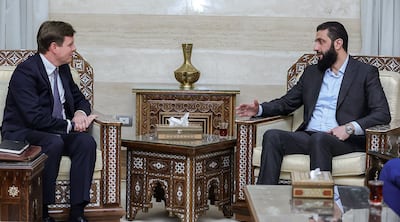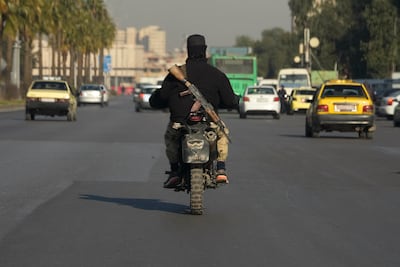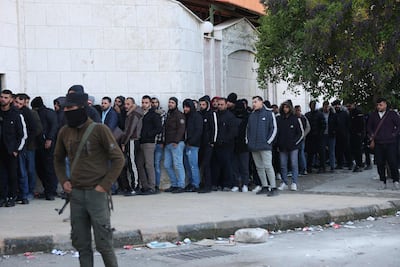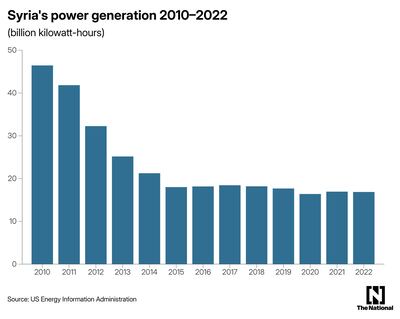Live updates: Follow the latest on Syria
At the beginning of an Oil Ministry meeting in Damascus this week, the new director general introduced himself to staff as Abu Tareq. The only certain assumption they made about him is that he is a Sunni, one of many from the majority sect swiftly replacing overwhelmingly Alawite line managers across the Syrian government.
“No one knows Abu Tareq’s real name,” said one official who attended the meeting. Its focus was the biting fuel and spare parts shortages in a country that has just witnessed the toppling of 54 years of Assad family rule.
Since Hayat Tahrir Al Sham ousted Bashar Al Assad on December 8, the rebel group, which traces its roots to Al Qaeda, has been replacing Alawite line managers in state institutions in what some fear could become a new oligarchy.
Concerns about what sort of country mainly Sunni Syria will transform into – hardline like Taliban-ruled Afghanistan, or moderate in the mould of Turkey or Indonesia – has overshadowed HTS's fast takeover of the reins of the county’s vast and USSR-styled bureaucracy.
If HTS runs an efficient government, eases chronic shortages and curbs monopolies, this could expand support for the group beyond its rural base. The group's leader, Ahmed Al Shara, is from rural areas west of Damascus, and HTS launched its blitz against the former regime forces from north-west Idlib.
The area is part of Turkey's zone of influence in Syria. Since the civil war in late 2011, Syria has also fragmented into US, Iranian and Russian-backed zones. The latter two have all but disappeared after HTS and its allied factions captured power.

Mr Al Shara has been meeting Arab and western officials caught off guard by the new HTS government. He has promised to build a corruption-free state to replace the deposed kleptocracy, but gave no direct commitment to democracy and scant information about how the country is currently being run.
It is still not clear whether ministers have been officially appointed, with reports that Mr Al Shara had appointed his brother as health minister, and his brother-in-law to form a new customs department. The previous customs department, now dissolved by Mr Al Shara, was a fief of Bashar's brother Maher Al Assad, who is widely believed to have made a personal fortune exceeding official state customs revenue.
But the real power in the Assad regime's bureaucracy lay with Alawite general managers and similar level positions. Ministers, who were mostly Sunni, had little real authority.
Friends in high places

So far, Mr Al Shara appears to be replicating the old order. Almost all of the new appointees are cadres drawn from HTS, the rebel group Ahrar Al Sham, an ideological twin, and the Syrian Muslim Brotherhood, which has found a new political life by swiftly aligning with him. For example, he appointed Jamal Al Sheikh, an HTS commander from an established Idlib clan as chief of police in Deraa, all the way on Syria's southern border, a clan member well-connected with HTS told The National.
Sheikh Anas Ayrout, a preacher, has been appointed to administer the coastal governorate of Tartus. Mr Ayrout previously taught Islamic theology at an HTS-controlled university in Idlib. He is from Tartus but has little administrative experience. Other newly appointed officials were plucked out of their administrative positions in HTS-run Idlib and brought to Damascus.
There have been very few official announcements about the new appointees, in line with the secrecy that characterises HTS modus operandi. Its personnel mostly come from the countryside, the reservoir of the armed revolt against Mr Al Assad. Already some city dwellers feel unease about the influx of people into Damascus, either as visitors or members of the new HTS order.
“Strangers,” a prominent doctor said of bearded traffic police stationed by HTS.
A new kind of justice

Mr Al Shara has also appointed preachers as arbiters, as he steers away from revealing whether Syria's legal system will be retained. It is largely a copy of Napoleonic codes bar the repressive edicts under Bashar and his father Hafez Al Assad.
Another doctor lost tens of thousands of dollars when his safe deposit box at a branch of the state-owned Syrian Commercial Bank in the Victoria area of Damascus was stolen the day Mr Al Assad fell. He took his case to an HTS figure known as Sheikh Al Hisbeh (roughly translated as the decider), based in an abandoned security building. The safe was one of 40 whose contents also vanished on December 8.
“It was an insider job because the safes were opened with the master keys,” he said. “Sheikh Al Hisbeh took my name and told me to check back with him next week.
“Not that the regime was any better, but it felt like I was in the Dark Ages,” the physician said.
People have been also taking their issues to the defunct Old Officers Club in the capital, where HTS commanders are based. One Sunni businessman, whose apartment near Youssef Al Azmeh Square was confiscated in 2018 and given to an Alawite officer, went to the club and demanded help to get his home back.
The National witnessed as he rode in an armoured vehicle with an HTS commander from Idlib, followed by four fighters in another vehicle. The group showed the property deed to the woman who opened the door, and she was asked to vacate the property immediately. She hurriedly collected her belongings, and the Sunni businessman left to buy a new lock.
“The problem now is to restore my name as the official owner. Do you know anyone from HTS at the Land Department?” he asked the group.
Troubleshooting from high office
Back at the Oil Ministry, the new supremo, Abu Tareq, asked his subordinates what the immediate energy problems were, an official who attended the meeting but did not want to be named, said.
Staff answered that diesel brought in illicitly by sea by Qaterji, a company linked with the deposed ruling elite, is no longer arriving because it fears the consequence of having links with Mr Al Assad.
Abu Tareq was also told that new valves for household gas cylinders are urgently needed. Past tenders failed because each time a company belonging to a faction in the kleptocracy won a contract to make them, another faction objected and the tender would have to be reissued, ad nauseam.

In front of the staff, Abu Tareq made a couple of calls to suppliers he apparently knew in Idlib, who deal with Turkey, and announced that the valves would be on their way to Damascus within days.
Even before the civil war, Syria suffered a substantial development gap as the elite eradicated the rule of law. Electricity production covered just 70 per cent of demand and foreign investment was virtually non-existent.
Syria's infrastructure was assessed by the World Economic Forum Global Competitiveness Report of 2010-2011 to be 95th in the world, compared with 35th for Jordan and 132nd for Lebanon.
The last power plants were built in the mid-1990s and the country's two refineries date back three to four decades No foreign investor risked subscribing to tenders to build new refineries.
Power in the country for the last six decades was dominated by members of the Alawite minority, after mostly Alawite officers took power in a 1963 coup. They ran Syria with an iron fist, having co-opted many Sunni merchants and tribes. The ensuing kleptocracy was little concerned about bridging a costly development gap or lifting Syria out of its status as an economic backwater as long as they kept enriching themselves.
Many are anticipating that the current diesel shortages will be soon solved through supplies from Turkey, already seen as a big brother of Mr Al Shara. But one former dissident contemplating going back to Damascus from exile in Jordan said Mr Al Shara's methods of governing are “crazy”.
“He needs to rebuild Syria and Turkey cannot do it for him. He needs the United States, and for that he needs to change and make a real transition,” he said, pointing out that Washington has not lifted its designation of HTS as a terrorist organisation.


